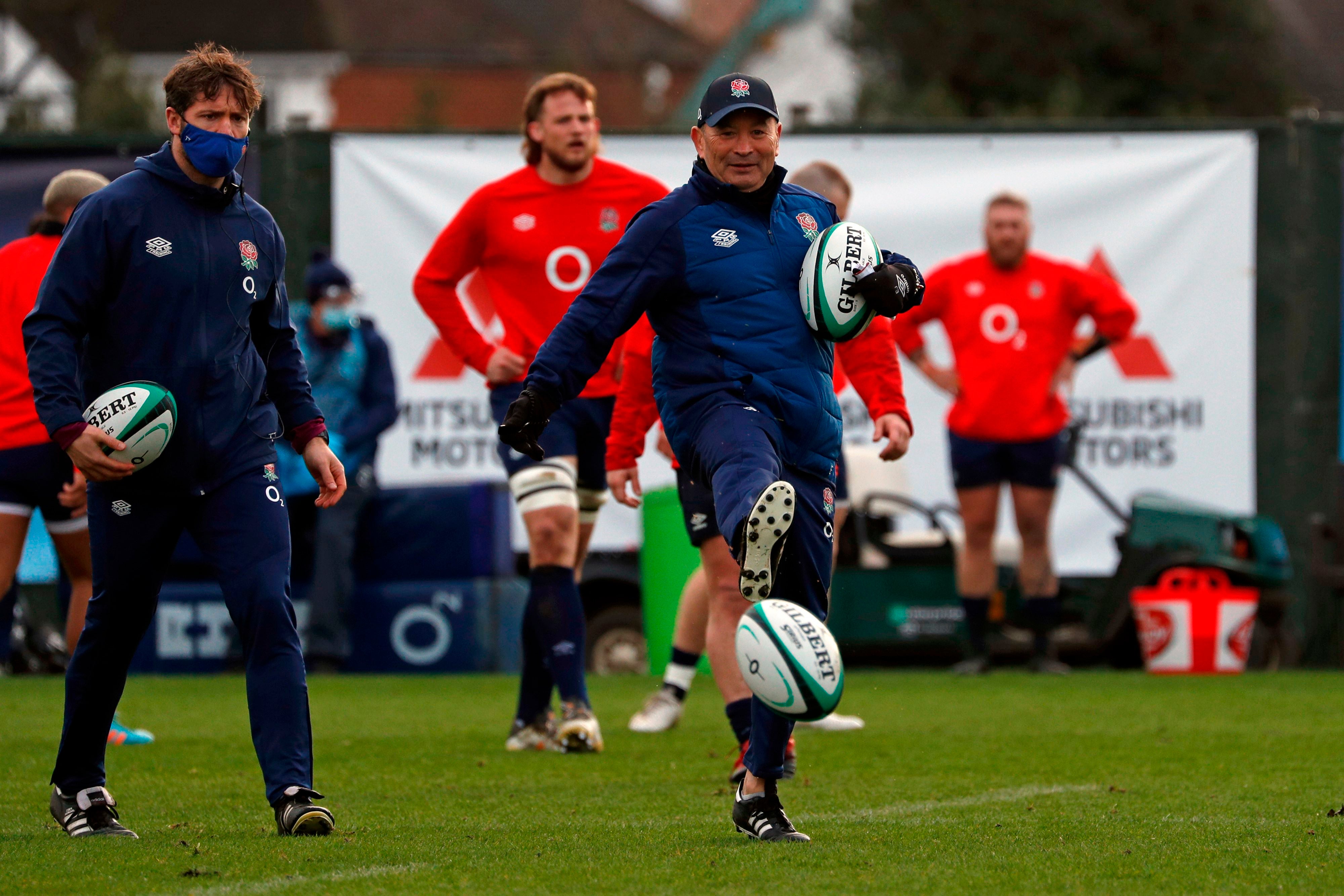Six Nations: Scotland aim to topple England’s deserted fortress in historic meeting
Scots seek first win at Twickenham since 1983 as they kick off campaign against old rivals

In novel times, perhaps an encounter between the oldest of foes is a fitting way to begin two Six Nations campaigns that promise much. 150 years after their first meeting, England welcome Scotland to their deserted concrete stronghold with a Six Nations crown to defend in most unfamiliar circumstances.
It is easy to forget that Eddie Jones’ side departed 2020 with two trophies, inaugural victors of the Autumn Nations Cup to follow a 29th Six Nations title. In the absence of fans and fanfare, neither the low-key sealing of this championship in Italy in October nor the controversial extra-time victory over France’s second string that secured the Autumn Nations Cup were triumphant occasions to trumpet.
This time last year England’s head coach was talking of “absolute brutality” and England becoming one of the greatest ever teams – quite understandably, the messaging this year is not quite as forceful.
READ MORE: Can unique Six Nations lift rugby from bleakest moment?
“Our players love playing rugby and we have got this enormous opportunity to play rugby when things are so tough in society,” Jones said ahead of his side’s opening Six Nations game.
“The opportunity to play for England is motivation enough. We know that we are going to have to be at our best to beat Scotland because they have been prioritising this game. We are working really hard to make sure we are right for Saturday.”
The men tasked with beginning the defence of their Six Nations crown include centre Ollie Lawrence, a “project player” for Jones, picked to add might and muscle to the midfield inside Henry Slade. Owen Farrell starts at fly-half having not played since that game against France, with George Ford withheld on the bench.
“We select a squad of 23, and it is an important 23,” Jones said of his chosen combinations. “The reality of England-Scotland games, and I think the history shows this, is that the game is usually won in the last 20 minutes. In a lot of respects our finishing team is more important than our starting team.”

Deprived of five key men up front through a combination of injury (Joe Launchbury, Sam Underhill, Mako Vunipola), the suspension of Kyle Sinckler and Joe Marler’s decision not to join England’s bubble, there are opportunities for Mark Wilson in the back-row and Jonny Hill at lock, two physical workhorses in what could be a tough battle up front. Beno Obano is poised for a debut from the bench, but Jones has resisted the temptations of spark plugs Harry Randall and Paolo Odogwu.
The challenge for travellers Scotland should not be understated. They might have claimed the Calcutta Cup a respectable 40 times but they have not triumphed at Twickenham in 38 years. However, the empty terraces will add a degree of novelty, and Gregor Townsend’s side will take confidence from their last trip here, that topsy-turvy game of two halves that finished 38 points apiece. With greater nous, Scotland may have held on to a famous comeback victory two years ago, but having played England close in a gruelling battle at Murrayfield last year, they will again travel hopeful of ending that winless run.
The progress made by this side in last year’s disrupted edition was built on defence. Led by dynamic duo Hamish Watson and Jamie Ritchie, who spoil and smother as well as any flankers in the competition, a group possessing real physicality and unity has begun to emerge.
READ MORE: Calcutta Cup – Five iconic matches as England face Scotland
They say hello to their own midfielder of real promise, one who until recently appeared destined to be playing his international rugby south of the border. Bath’s Cameron Redpath – born in France, educated in England, but son of 60-cap Scottish scrum-half Bryan - has been tempted away from the fringes of Jones’ squads and Townsend will hope he can complete an exciting looking backline.
Redpath will perhaps draw on the defensive steel of Chris Harris, a favourite of captain Stuart Hogg, alongside him as he prepares for a heavy dose of wrecking ball Lawrence down his channel. The two inside centres are former England Under-20 colleagues and good friends – newly added spice to this famous and historic rivalry.
As always, much of the attention will rest on Finn Russell. The gifted fly-half is past the drama of this time last year and has recovered from injury to hopefully get this backline to click. His meeting with opposite number Farrell, the fierce pragmatist against the grand entertainer, has added fascination ahead of what still appears to be a British and Irish Lions summer. “Some of his short kicking game is outstanding, and he is constantly testing you. He is going to be a tough challenge,” commented England’s captain on the dangers posed.
Neither Farrell nor Jones were drawn on specific counters to Russell’s considerable talents, choosing instead to focus on their defensive processes that will target the Scottish half-backs and try to stymie attacking ball.

This year marks not just 150 years since the first playing of this fixture, but also since the forming of the Rugby Football Union (RFU). The Scottish players will wear kits embroidered with the name of their equivalent player from that first meeting, while England have gone a step further with a one-off, heritage kit. That it is little more than a white T-shirt branded with a prominent red logo suggests that the RFU may be a little more in touch with the youth of today than would first appear.
Plenty has changed since that first meeting at Raeburn Place, a game that ended with Scotland the victors by one goal to none, having scored two tries to England’s one. Even the basic tenet that the sport be played for the joy of the people has been challenged in this strange year: 4,000 spectators were said to have been in attendance in the Edinburgh suburbs; Twickenham will lay close to empty on Saturday.
This could be an opportune moment for Scotland to topple the deserted fortress for the first time since 1983 to add a further twist to a unique chapter of this most storied rivalry.
Rugby coverage is brought to you in association with QBE who help businesses build resilience through risk management and insurance. For more information go to QBEEUROPE.com
Join our commenting forum
Join thought-provoking conversations, follow other Independent readers and see their replies
Comments
Bookmark popover
Removed from bookmarks